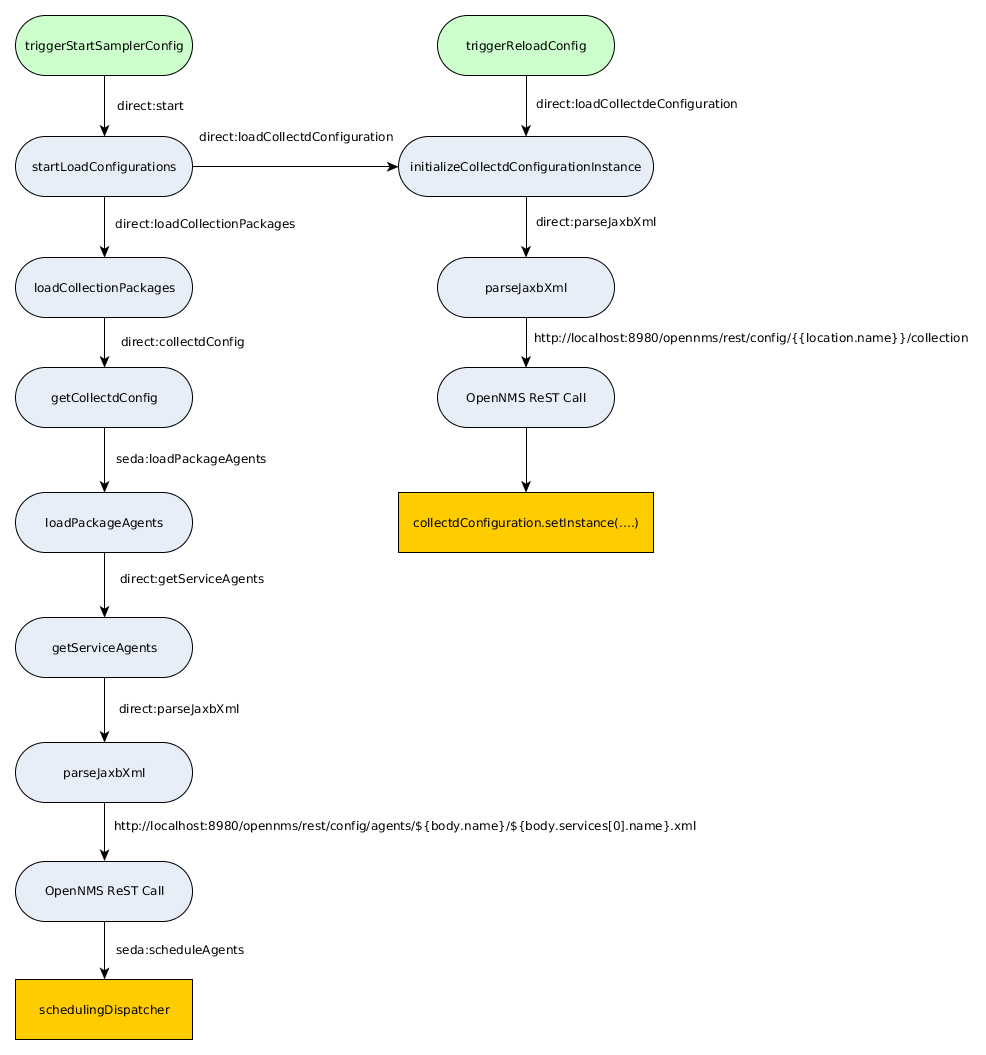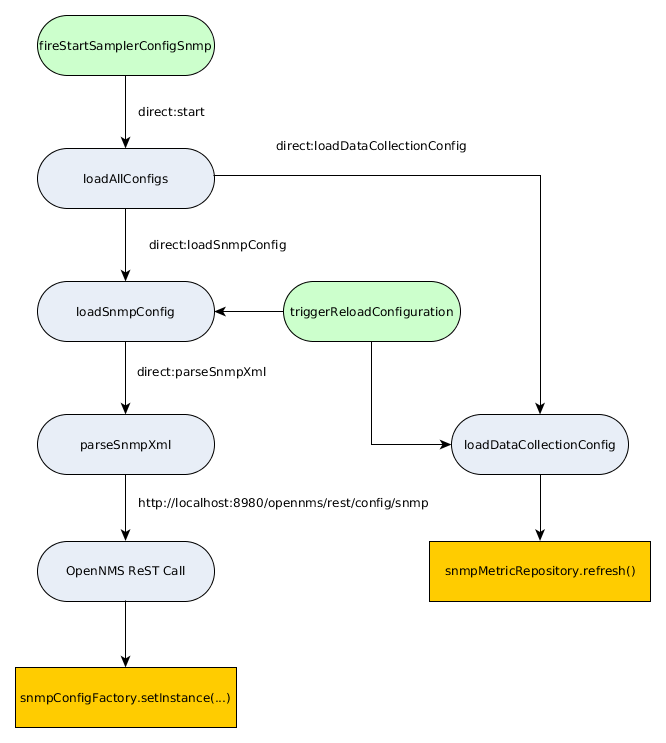This document should help you understand the message flow through the Sampler projects. The captions in bold denote Camel route IDs. In general, within each project messages are passed using a Camel context definition that is defined in the 'OSGI-INF/blueprint*.xml' files.

To get started you should have a look at these pages:
1. OpenNMS ReST services
OpenNMS provides a couple of ReST services the Samplers consume. These services are defined in class org.opennms.web.rest.ConfigRestService
1.1. /config/{location}/collection
Method |
GET |
Description |
Loads the collectd-configuration.xml for the given The If you want the sampler to collect data, a valid |
Produces |
application/xml, application/json, application/atom+xml |
Status |
200 |
Request |
|
Response |
Returns a |
Errors |
404 if no entry for |
1.2. /config/agents/{filterName}/{serviceName}
Method |
GET |
Description |
Loads all nodes/agents according to |
Produces |
application/xml, application/json, application/atom+xml |
Status |
200 |
Request |
|
Response |
Returns a org.opennms.netmgt.config.agents.AgentResponseCollection,
which contains |
Errors |
404 if no |
1.3. /config/agents/{filterName}/{serviceName}.xml
Method |
GET |
Description |
The same as described here but not accepting all media types. |
Produces |
application/xml, application/atom+xml |
1.4. /config/agents/{filterName}/{serviceName}.json
Method |
GET |
Description |
The same as described here but not accepting all media types. |
Produces |
application/json |
1.5. /config/datacollection
Method |
GET |
Description |
Loads the datacollection-config.xml. |
Produces |
application/xml, application/json, application/atom+xml |
Status |
200 |
Request |
|
Response |
The result is the |
Errors |
404 if no |
1.6. /config/snmp
Method |
GET |
Description |
Loads the snmp-config.xml. |
Produces |
application/xml, application/json, application/atom+xml |
Status |
200 |
Request |
|
Response |
The result is the |
1.7. /config/polling
Method |
GET |
Description |
Not yet documented. You can find the code in class |
1.8. /config/jmx
Method |
GET |
Description |
Loads the jmx-datacollection-config.xml. |
Produces |
application/xml, application/json, application/atom+xml |
Status |
200 |
Request |
|
Response |
The result is the |
2. Dispatcher Whiteboard
Between projects or Camel Contexts messages are forwarded by a DispatcherWhiteboard.
This class implements the Whiteboard Pattern.
It defines a @Consume method, which enables the DispatcherWhiteboard as an endpoint consumer. The endpoint is defined with property m_endpointUri.
<bean id="schedulingDispatcher" class="org.opennms.netmgt.api.sample.support.DispatcherWhiteboard">
<argument value="seda:scheduleAgents"/>
<property name="context" ref="blueprintBundleContext"/>
<property name="messageClass" value="org.opennms.netmgt.api.sample.PackageAgentList"/>
<property name="serviceClass" value="org.opennms.netmgt.api.sample.support.SchedulerService"/>
<property name="methodName" value="schedule"/>
</bean>All messages to endpoint seda:scheduleAgents are forwarded to SchedulerService objects registered in OSGi.
The SchedulerService needs to implement a method schedule with one parameter PackageAgentList.
| By using the whiteboard pattern, the modules can be completely decoupled from one another. This means that larger modules do not have any runtime dependencies on one another and can be loaded in any order. However, if messages are passed to a DispatcherWhiteboard and zero services are registered for the interface that services that endpoint, the messages will be dropped at that point in the processing. |
3. sample-api
Contains API and utility code that is reused or implemented in other modules.
Does not define any routes at the moment.
4. sampler-config
The routes defined in the blueprint-sampler-config.xml are described in the following figure.

-
triggerStartSamplerConfig: Fires once to endpoint
direct:startto start up all messaging (startup hook) -
triggerReloadConfig: Fires a config reload every 30 seconds.
-
startLoadConfigurations: Loads all configuration objects by fetching REST content from the OpenNMS server
-
loadCollectionPackages: Extracts the packages from the collectd configuration. It then splits each package into
one-service-per-packagepackages, so each package only contains one service defintion. Thisone-service-per-packagemessage is forwarded to theloadPackageAgentsendpoint. The following example would be converted to two packages [example1, SNMP] and [example1, OpenNMS-JVM].<package name="example1"> <filter>IPADDR != '0.0.0.0'</filter> <include-range begin="1.1.1.1" end="254.254.254.254"/> <include-range begin="::1" end="ffff:ffff:ffff:ffff:ffff:ffff:ffff:ffff"/> <!-- SNMP --> <service name="SNMP" interval="300000" user-defined="false" status="on"> <parameter key="collection" value="default"/> <parameter key="thresholding-enabled" value="true"/> </service> <!-- JMX --> <service name="OpenNMS-JVM" interval="300000" user-defined="false" status="on"> <parameter key="port" value="18980"/> <parameter key="retry" value="2"/> <parameter key="timeout" value="3000"/> <parameter key="protocol" value="rmi"/> <parameter key="urlPath" value="/jmxrmi"/> <parameter key="rrd-base-name" value="java"/> <parameter key="ds-name" value="opennms-jvm"/> <parameter key="friendly-name" value="opennms-jvm"/> <parameter key="collection" value="jsr160"/> <parameter key="thresholding-enabled" value="true"/> </service> </package> -
loadPackageAgents: Processes the
one-service-per-packagemessage and loads the agent list for this service. The result is transformed to aorg.opennms.netmgt.api.sample.PackageAgentListand forwarded to endpointseda:scheduleAgents. -
seda:scheduleAgents: This endpoint is serviced by the
schedulingDispatcherbean (see DispatcherWhiteboard). This bean is an OSGi whiteboard which consumes from the seda:scheduleAgents endpoint and invokes the schedule method on all OSGi services that are registered with the org.opennms.netmgt.api.sample.support.SchedulerService interface.
<bean id="schedulingDispatcher" class="org.opennms.netmgt.api.sample.support.DispatcherWhiteboard">
<argument value="seda:scheduleAgents"/>
<property name="context" ref="blueprintBundleContext"/>
<property name="messageClass" value="org.opennms.netmgt.api.sample.PackageAgentList"/>
<property name="serviceClass" value="org.opennms.netmgt.api.sample.support.SchedulerService"/>
<property name="methodName" value="schedule"/>
</bean>5. sampler-scheduler
-
scheduler: Bean that implements the
SchedulerServiceinterface. This bean takes incomingPackageAgentListmessages, and adds each Agent to a scheduler. When the task is scheduled to execute it enqueues them to all registeredorg.opennms.netmgt.api.sample.AgentDispatcherobjects.
Each AgentDispatcher must be registered with a service property matching the service-name from the service-defintion in collectd configuration.
Otherwise dispatching will not work!
|
Defines routes indirectly due to the AgentDispatcher.
Each dispatcher sends the agent message to the defined endpoint (e.g. DefaultAgentDispatcher in sampler-snmp)
|
blueprint.xml<service ref="snmpSampler" interface="org.opennms.netmgt.api.sample.AgentDispatcher">
<service-properties>
<entry key="org.opennms.netmgt.sampler.scheduler.serviceName" value="SNMP"/>
</service-properties>
</service>6. sampler-config-snmp
This project uses Camel to load SNMP-specific configuration data via REST from the OpenNMS server and then provides that configuration data as OSGi services for use by the sampler-snmp project.
The routes defined in the blueprint-sampler-config-snmp.xml are described in the following figure.

-
fireStartSamplerConfigSnmp: Fires once with a delay of 30 seconds to endpoint
direct:startto load all configs. -
triggerReloadConfiguration: Triggers a configuration reload every 30 seconds.
-
loadAllConfigs: Is a wrapper to invoke endpoinds
direct:loadSnmpConfiganddirect:loadDataCollectionConfig. -
loadSnmpConfig: Loads the SNMP-specific configuration data via REST from the OpenNMS server.
-
loadDataCollectionConfig: Invokes
refreshon thesnmpMetricRepositorybean. -
Future: The
fireStartSamplerConfigSnmpmay not be needed, because thetriggerReloadConfigurationalready shedules a config reload
<service ref="snmpConfigFactory" interface="org.opennms.netmgt.api.sample.support.SingletonBeanFactory">
<service-properties>
<entry key="beanClass" value="org.opennms.netmgt.config.snmp.SnmpConfig" />
</service-properties>
</service>
<service ref="snmpMetricRepository">
<interfaces>
<value>org.opennms.netmgt.api.sample.CollectionConfiguration</value>
<value>org.opennms.netmgt.api.sample.MetricRepository</value>
</interfaces>
<service-properties>
<entry key="protocol" value="SNMP"/>
</service-properties>
</service>
<service ref="snmpAgentRepository" interface="org.opennms.netmgt.api.sample.AgentRepository">
<service-properties>
<entry key="protocol" value="SNMP"/>
</service-properties>
</service>7. sampler-snmp
This context registers a bean named snmpSampler as an org.opennms.netmgt.api.sample.AgentDispatcher which forwards the message into the seda:collectAgent endpoint in the collectAgent route.
-
blueprint.xml
-
collectAgent: Enhances the Agent message with SNMP-specific information (OIDs to collect, SNMP credentials) and then collects it using the snmpCollector bean.
-
sampleSet: Sends the completed
SampleSetto all registered org.opennms.netmgt.api.sample.SampleSetDispatcher services. -
seda:saveToRepository: This endpoint is serviced by the
sampleSetDispatcherbean. This whiteboard consumes from theseda:saveToRepositoryendpoint and invokes the save method on all OSGi services that are registered with theorg.opennms.netmgt.api.sample.SampleSetDispatcherinterface.
-
<bean id="sampleSetDispatcher" class="org.opennms.netmgt.api.sample.support.DispatcherWhiteboard">
<argument value="seda:saveToRepository"/>
<property name="context" ref="blueprintBundleContext"/>
<property name="messageClass" value="org.opennms.netmgt.api.sample.SampleSet"/>
<property name="serviceClass" value="org.opennms.netmgt.api.sample.SampleSetDispatcher"/>
<property name="methodName" value="save"/>
</bean>